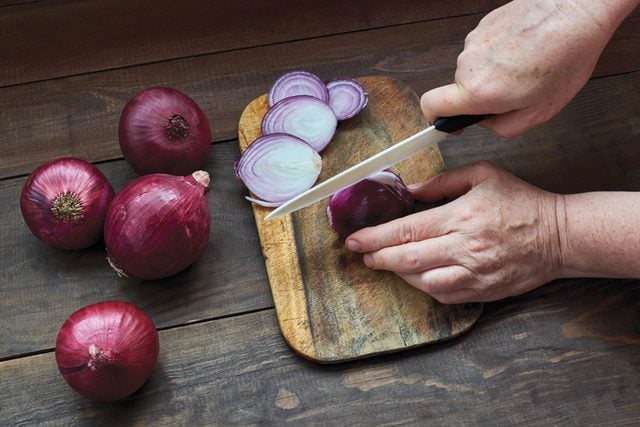Why Do Onions Make You Cry?
Updated: Apr. 05, 2021
Grilled, fried, caramelized, or raw, onions will always provide affordable flavor. But why must we cry?

Onions pull pretty much any dish together. Raw, they add a bite to your salad or sandwich; caramelized, they add a savory sweetness to any hot dish. Really, there are very few dishes that we wouldn’t add a bit of onion to! The only problem comes when chopping them up: Why do onions make you cry?
This question, why do onions make you cry, is so important that it warranted a Library of Congress web page. The short, government-doled answer provided by the Library is “unstable chemicals.” But that could also be provided as an oversimplified answer to the question “why does nuclear fission happen?” So, a little bit more context is needed. Until then, make sure you know the right way to store potatoes and onions.
Pinpointing the precise unstable chemical responsible for turning your tear ducts into water slides has been a long process, with the most recent development coming just 17 years ago. Originally, it was believed that the alliinase, an enzyme also found in garlic, was the culprit. But anyone who has chopped garlic will tell you two things about the flavorful bulbs: First, that they protect you from vampires; and second, that they do not make you cry. So why do onions make you cry but garlic doesn’t?
Onion weeping theory has been narrowed down to two chemicals: syn-Propanethial-S-oxide, an irritant that stimulates the eyes’ lacrimal glands, which release tears; and lachrymatory-factor synthase. The latter culprit is a little-known enzyme which was discovered thanks to several Japanese studies circa 2002. On the other hand, these mysteries about the human body still haven’t been solved.
According to the Library of Congress, the chemical process is as follows:
- Lachrymatory-factor synthase is released into the air when we cut an onion.
- The synthase enzyme converts the amino acid sulfoxides of the onion into sulfenic acid.
- The unstable sulfenic acid rearranges itself into syn-Propanethial-S-oxide.
- syn-Propanethial-S-oxide gets into the air and comes in contact with our eyes. The lacrimal glands become irritated and produce the tears!
All of these irritants are released in greater volume if you choose to use a dull knife, because using a blunt blade is like hacking away at the cell wall of the onion with a baseball bat, causing excessive damage and releasing extra chemicals. A sharp knife provides surgical precision, less cell wall damage, and, in turn, fewer chemicals released. Voilà! A tear-free cooking experience (unless you burn the food, of course). Next, find out which myths about how to keep from crying while chopping onions are true.